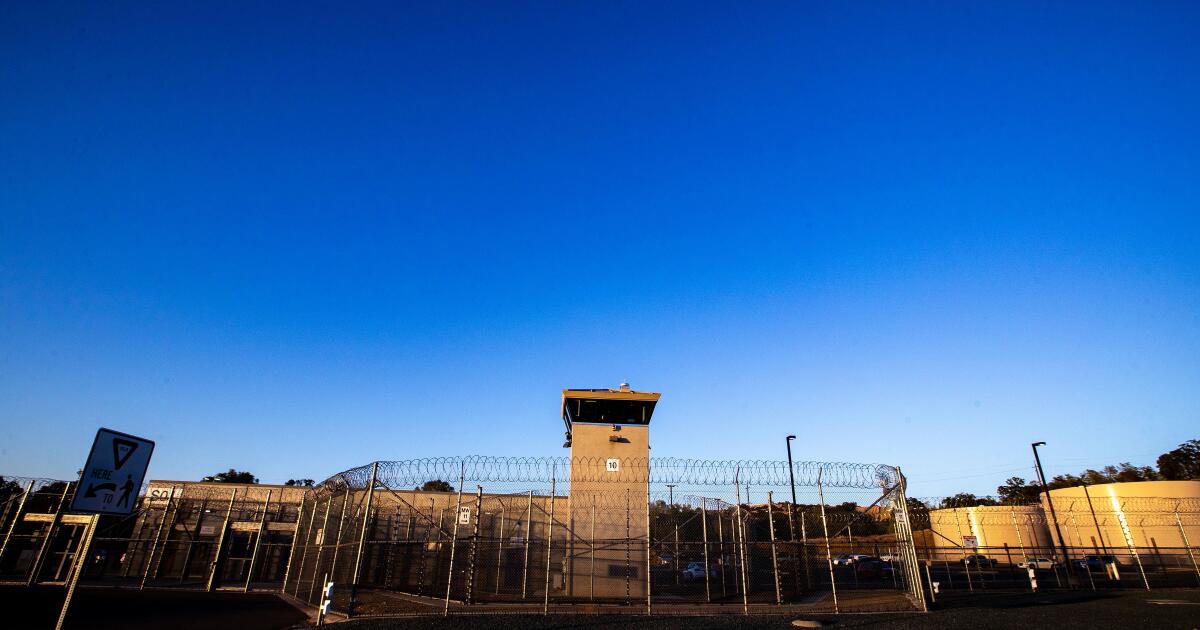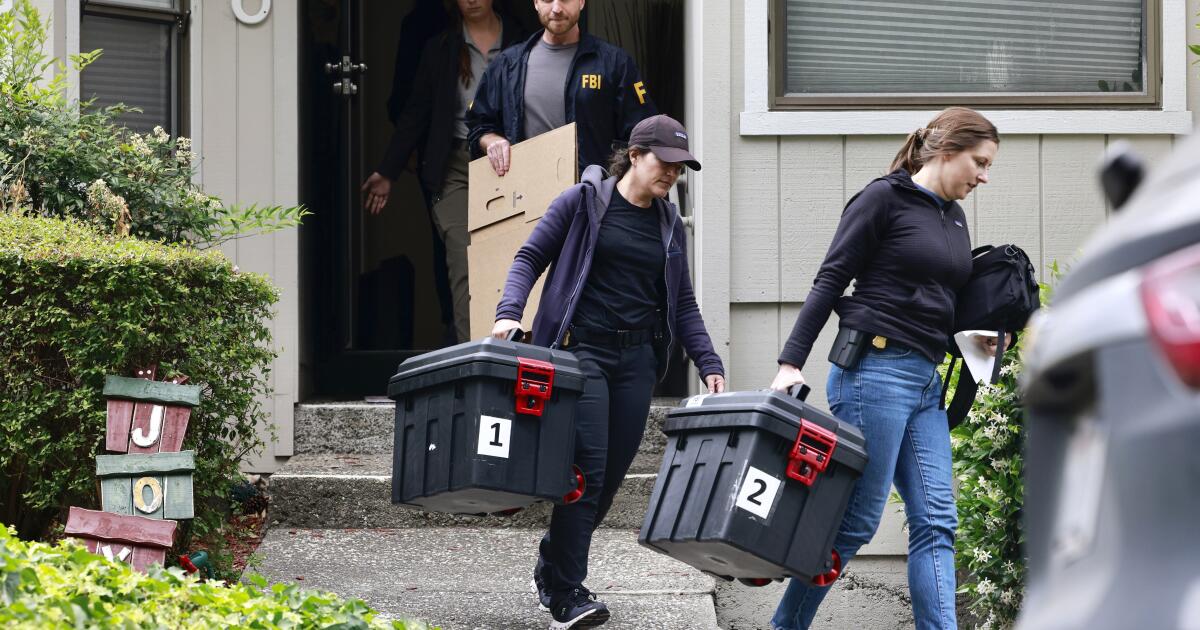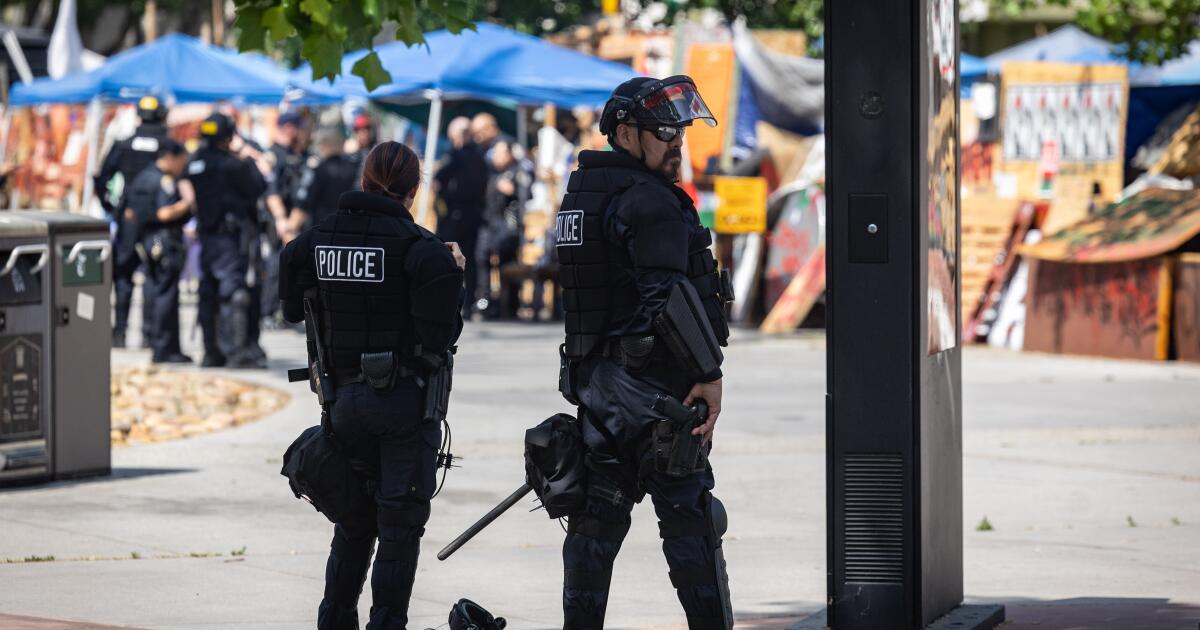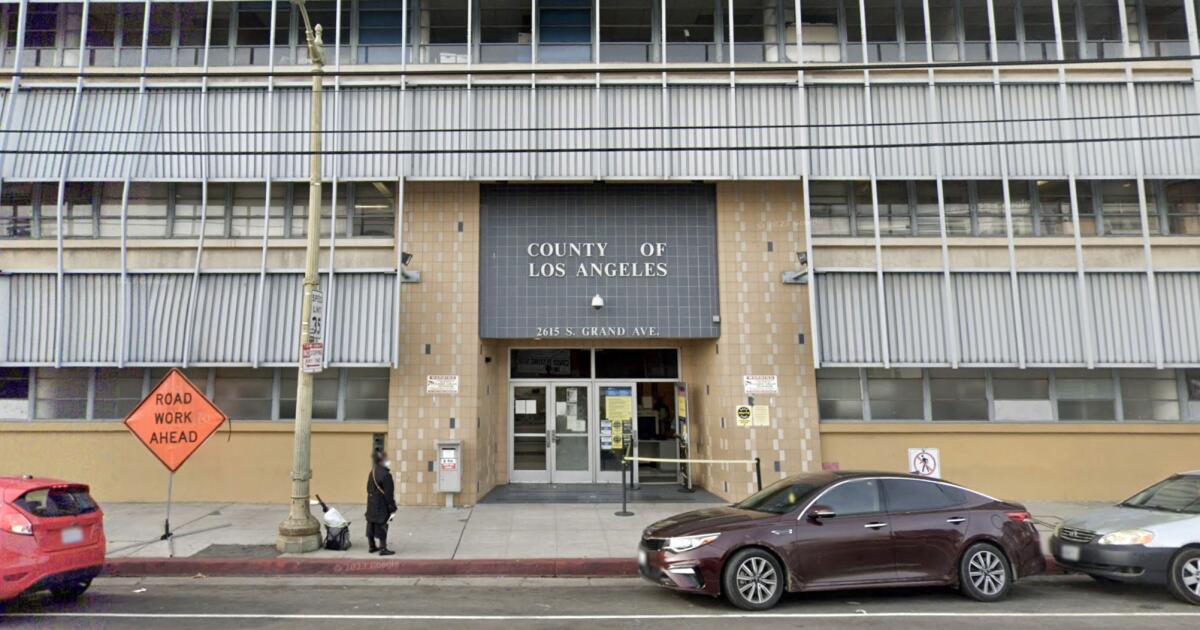World News
No felony charges in attack on UCLA pro-Palestinian protesters


A pro-Israeli counterprotester will not face felony assault charges in connection with an alleged attack against occupants of a Palestinian solidarity encampment at UCLA last month, Dist. Atty. George Gascón’s office announced Friday.
Instead, the Los Angeles district attorney’s office announced that after reviewing the evidence against 18-year-old Edan On, the case was referred to the city attorney’s office for a possible misdemeanor filing.
On was identified as a counterprotester at an April 30 pro-Palestinian demonstration at the UCLA campus. In widely shared videos, a masked man in a white hoodie can be seen repeatedly striking protesters with a pole. Law enforcement sources identified the man as On and video of his actions were first aired by CNN.
The UCLA Police Department interviewed witnesses and victims in connection to the violence that erupted at the encampment, reviewed security camera footage of the masked man and later identified him as On. Pro-Israeli counterprotesters armed with fireworks, gas irritants, and blunt objects violently attacked students and faculty in the encampment for hours as private security guards and campus police watched from a distance.
On was detained by police on May 23 at a business in Beverly Hills and booked on suspicion of felony assault with a deadly weapon, police announced at the time. He was held in a Los Angeles County Jail on $30,000 bail and his arrest marked the first in connection to the violent scene that unfolded at UCLA.
On allegedly assaulted a person between 12:30 p.m. on April 30 to 1:30 a.m. on May 1 during the clash at UCLA, Gascón’s office said in a statement.
Gascón’s office reviewed the evidence in the case, but “cannot establish beyond reasonable doubt that Mr. On’s conduct directly caused the victim’s injury.”
Gascón goes on to say that there is “no evidence to suggest that Mr. On was working in collaboration with any other individuals, and our investigation found no proof of conspiracy or any organized effort by Mr. On related to the incident.”
There are no other alleged victims in the matter, the DA’s office said. The city attorney’s office did not immediate respond to requests for comment regarding the case.
“This referral aligns with our commitment to applying the law fairly and ensuring that justice is served based on the available evidence,” Gascón’s office said.
The DA’s office is reviewing one other case involving the attacks at the UCLA encampment, but details on that matter have not been released.
Protesters erected their encampment on the UCLA campus to demand the university divest any financial ties with Israel over the country’s ongoing war against Gaza in response to an Oct. 7, 2023, terrorist attack.
Following the April 30 brawl, On’s mother posted an online comment about his involvement.
In a now deleted Facebook post, Sharon On-Siboni shared a photo of her son from a Fox 11 news segment at UCLA that she captioned in Hebrew, saying, “Edan went to bully the Palestinian students in the tents at UCLA and played the song that they played to the Nukhba terrorists in prison!” according to a law enforcement source.
World News
Lawmakers add measure to end forced prison labor to ballot


California lawmakers voted to place a constitutional amendment on the November ballot to completely ban involuntary servitude, a change that would remove an exception in cases involving the punishment for a crime.
If passed by voters, the ballot measure would end mandatory work requirements for state prisoners, instead making jobs for those incarcerated voluntary.
“The current practice of forced labor does not prepare incarcerated people for success upon reentry and often prevents rehabilitative services,” said Sen. Steven Bradford (D-Gardena) during Thursday’s floor session. “Let us take this step to restore some dignity and humanity for the often forgotten individuals behind bars.”
The California Constitution mirrors the 13th Amendment of the U.S. Constitution and prohibits slavery and involuntary servitude. However, both allow involuntary servitude as punishment for a crime.
The first push to remove that exception from the state Constitution stalled in 2022 after the state Department of Finance estimated that barring forced labor could cost the state billions of dollars annually if the Department of Corrections and Rehabilitation were forced to pay prisoners the minimum wage.
The proposed constitutional amendment is one of 14 bills introduced by the California Reparations Task Force, which has sought to create proposals and recommendations to address the injustices and inequities sustained by the descendants of African Americans enslaved in the U.S.
“As we do the work of reparations we refer to slavery as a relic of the past,” said Sen. Lola Smallwood Cuevas (D-Los Angeles). “But as I stand here today we have thousands of indentured servants in our penal system.” The measure passed the Senate and Assembly with bipartisan support.
Assemblymember Lori Wilson (D-Suisan City), chair of the Legislative Black Caucus, revived the proposed constitutional amendment last year. Wilson said the effort has nothing to do with changing wages for prisoners. But Wilson expects the issue of minimum wages for prisoners to come up next session.
An earlier version of the proposal would have made prison work optional, but it did not strike language in the Constitution that says “involuntary servitude is prohibited except to punish crime.”
After negotiations, the governor’s office and advocates came together last week and the new version of the proposal would remove the language. Currently, the Department of Corrections is permitted to require able-bodied inmates to work for as little as 35 cents an hour.
Carmen-Nicole Cox, director of government affairs at ACLU California Action, who has been involved in negotiations, said the governor’s “fingerprints” are on the measure. There was no debate on the Senate and Assembly floors during Thursday morning’s votes.
The new proposed amendment, through Assembly Bill 628, a companion bill to the ballot language, would make prison work optional by instituting a voluntary work program. The bill also explicitly says the state would not be required to pay prisoners minimum wage and that the secretary of the Corrections Department would set prison wages. This was an amendment that criminal justice advocates pushed back on in negotiations with the governor’s office.
“We’ve had to make our concessions,” Cox told The Times. She added that, despite those compromises on wages, a triumph for advocates was to include language that forbids disciplinary actions against incarcerated individuals for denying a work assignment. “We will be the first state to amend the constitution and explicitly say you can’t punish people for refusing work.”
If passed it will go into effect Jan. 1, 2025.
World News
Judge stops parents’ effort to collect on $50M Alex Jones owes for saying Newtown shooting was hoax

A federal bankruptcy judge on Thursday stopped an effort by the parents of a boy killed in the Sandy Hook Elementary School shooting to begin collecting on some of the $50 million they won in a lawsuit against conspiracy theorist Alex Jones over his false claims that the massacre was a hoax.
Lawyers for Scarlett Lewis and Neil Heslin, whose 6-year-old son Jesse Lewis died in the 2012 Connecticut shooting, had obtained an order from a state judge in Texas earlier this month allowing them to begin collecting some assets from Jones’ company, Infowars’ parent Free Speech Systems. That order came after the company’s bankruptcy reorganization failed and its case was dismissed.
But U.S. Bankruptcy Judge Christopher Lopez in Houston said Thursday that the state judge’s ruling conflicts with federal bankruptcy law.
Lopez said a new trustee appointed to oversee the liquidation of Jones’ personal assets now has control of Jones’ ownership in Free Speech Systems. Lopez said the trustee, Christopher Murray, has authority under federal law to sell off the company’s assets and distribute the proceeds equally among all of Jones’ creditors, including other relatives of Sandy Hook victims who were awarded more than $1.4 billion in a similar lawsuit in Connecticut over Jones’ lies about the shooting.
“I don’t think the state court was actually informed of all these issues,” Lopez said.
Murray plans to shut down Infowars, the multimillion dollar money-maker Jones has built over the past 25 years by selling dietary supplements, survival gear and other merchandise.
Jones has about $9 million in personal assets, according to the most recent financial filings in court. Free Speech Systems has about $6 million in cash on hand and about $1.2 million worth of inventory, according to recent court testimony.
Bankruptcy lawyers for Jones and his company did not immediately return messages seeking comment Thursday. Jones said on his show Thursday that although Infowars may no longer exist in two to three months, he will restart his broadcasts on another platform he’ll have to build from scratch. He also said Lewis and Heslin’s efforts in Texas state court to get some of his assets were “illegal.”
Murray had filed a motion Sunday asking Lopez to halt Lewis and Heslin’s collection efforts in state court, saying they would interfere with the shut down and liquidation of Jones’ company.
Free Speech Systems, based in Jones’ hometown of Austin, Texas, filed for bankruptcy reorganization in July 2022 in the middle of the trial in Texas that led to the $50 million defamation award to Lewis and Heslin. Jones filed for personal bankruptcy reorganization later in 2022 after relatives of eight children and adults killed in the shooting won the Connecticut lawsuit.
On June 14, Lopez converted Jones’ personal bankruptcy reorganization case into a liquidation, meaning many of his assets will be sold off to pay creditors except for his main home and other property exempt from liquidation. The same day, Lopez also dismissed Free Speech Systems’ bankruptcy case after Jones and the families could not reach agreement on a final plan.
The bankruptcies automatically froze efforts by the Sandy Hook families to collect on the state lawsuit awards. Lawyers for Lewis and Heslin said the dismissal of Free Speech System’s case meant they could go back to the Texas state court in Austin and ask a judge to order the company to begin turning over money and other assets to Lewis and Heslin.
“Our clients are frustrated that they will not be allowed to pursue their state court rights after all,” said Mark Bankston, a lawyer for Lewis and Heslin. “Apparently this case will remain in limbo much to Mr. Jones’ delight while the other group of plaintiffs insist they are entitled to nearly all the recovery.”
Lewis and Heslin have been at odds with the relatives in the Connecticut lawsuit over how Jones’ bankruptcies should end and how his assets should be sold off.
Relatives in the Connecticut suit had fought the dismissal of Free Speech Systems’ bankruptcy, saying it would lead to a “race” between Sandy Hook families to the state courts in Texas and Connecticut to see who could get Jones’ assets first. The Connecticut plaintiffs favored the trustee’s motion to stop the collection efforts in Texas.
“The Connecticut families have always sought a fair and equitable distribution of Free Speech System’s assets for all of the families, and today’s decision sets us back on that path,” said Christopher Mattei, a lawyer for the Sandy Hook relatives who sued Jones in Connecticut.
The shooting in Newtown, Connecticut, killed 20 first graders and six educators. Not all of the victims’ families sued Jones.
The relatives said they were traumatized by Jones’ hoax conspiracies and his followers’ actions. They testified about being harassed and threatened by Jones’ believers, some of whom confronted the grieving families in person saying the shooting never happened and their children never existed. One parent said someone threatened to dig up his dead son’s grave.
Jones is appealing the judgments in the state courts. He has said he now believes the shooting did happen, but free speech rights allowed him to say it did not.
World News
How to Store All Your Passwords in Your Mac’s Menu Bar

With the launch of the Passwords app in macOS Sequoia and iOS 18 (currently in Developer beta), Apple has made it easy to find and access all your passwords, Passkeys, and even two-factor authentication codes with ease. What used to take a trip through various Settings app menus is now just a click away.
But as good as the Passwords app is, it’s little more than an app wrapper for the iCloud Keychain. While that itself is a huge improvement, we can make your Mac’s Passwords app even better by enabling a menu bar list that’s hidden by default.
How to enable the hidden Passwords menu bar list on macOS Sequoia
Before we start, you’ll need to install the macOS Sequoia beta. I recommend doing this on a backup device if possible, as it could introduce instability to your main device. First, back up your Mac. Then open System Settings, navigate to General > Software Update and click Beta updates. Select the latest macOS Sequoia developer beta.
Now, open the Passwords app and authenticate with your Mac password or Touch ID. From the menu bar, go to Passwords > Settings. Here, enable the Show Passwords in Menu Bar option.

Credit: Khamosh Pathak
You will see a key icon in the menu bar. That’s your Passwords app. Click the icon to see a drop-down menu. Authenticate using Touch ID or your Mac password, and you will see a list of all your passwords.
The really neat thing about this menu bar app is that it’s context aware. So it will automatically find a login that corresponds to the app that you have open. This works for desktop apps, and also for websites in third-party browsers like Chrome, Arc, and more.
If you’re trying to log in to Discord, for example, your Discord login will be at the top of the list, where you’ll be easily able to copy your password to your clipboard.

Credit: Khamosh Pathak
It’s no secret that I’m a fan of menu bar utilities. And seeing a useful little utility from Apple itself is quite refreshing. The Passwords utility will definitely be helpful for people who use third-party browsers, but don’t want to save passwords in Chrome or provide access to third-party browser extensions.
The biggest downside, though, is that the menu bar list doesn’t yet support autofill. If you’re used to just authenticating passwords using Touch ID in Safari, you’ll find this an odd adjustment.
-

 African History5 years ago
African History5 years agoA Closer Look: Afro-Mexicans 🇲🇽
-

 African History5 months ago
African History5 months agoBlack History Facts I had to Learn on My Own pt.6 📜
-

 African History5 years ago
African History5 years agoA Closer Look: Afro-Mexicans 🇲🇽
-

 African History1 year ago
African History1 year agoMajor African Tribes taken away during the Atlantic Slave Trade🌍 #slavetrade #africanamericanhistory
-

 African History1 year ago
African History1 year agoCameroon 🇨🇲 World Cup History (1962-2022) #football #realmadrid #shorts
-

 African History1 year ago
African History1 year agoPROOF AFRICAN AMERICANS AIN'T FROM AFRICA DOCUMENTED EVIDENCE
-

 African History4 months ago
African History4 months agoMr Incredible Becoming Canny/Uncanny Mapping (You live in Paraguay 🇵🇾)
-

 African History5 months ago
African History5 months agoBlack History Inventors: Mary Kenner 🩸





























